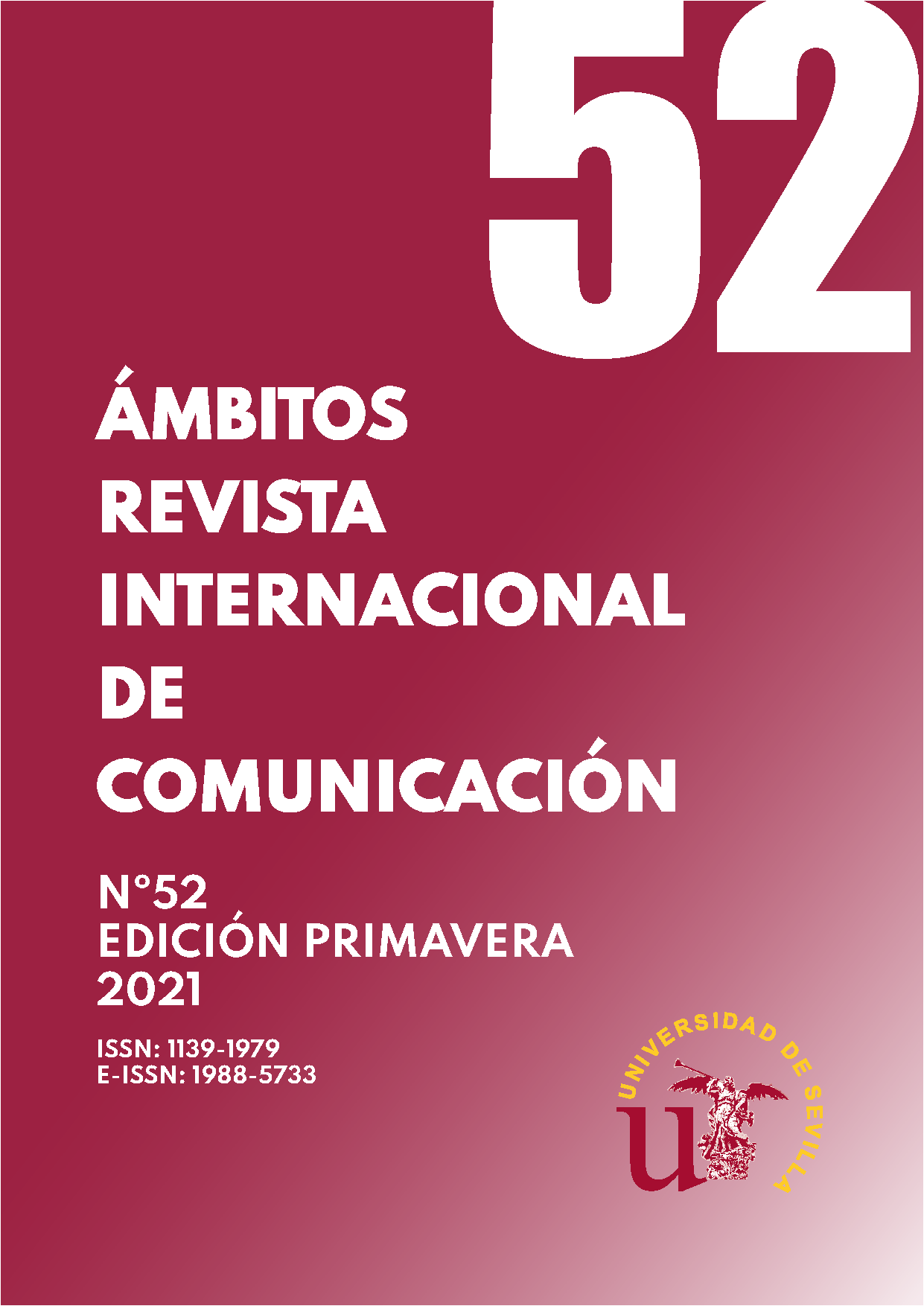Covid-19 coverage in Rio de Janeiro: aspects of the production routine of Local Newscast
DOI:
https://doi.org/10.12795/Ambitos.2021.i52.05Keywords:
Covid-19, telejournalism, Rio de Janeiro, adaptação, novas rotinasAbstract
Brazilian newscasts have experienced a series of changes in face of the challenges of Covid-19 coverage, with changes in production routines, demand for new functions and skills, and new productions of meaning on screens. The change in the anatomy of the newscast (Piccinin & Soster, 2012) went through phases, which also include the narrative construction that was being made about the pandemic itself at all times. The purpose of this article is to present an analysis of the pandemic coverage in 18 editions of the RJ1 and RJ2 newscasts, broadcast by Rede Globo in Rio de Janeiro. The method that was used is the Case Study (Yin, 2011), aplied in the first nine months of Covid-19 coverage, using as theorical reference the phases of Brazilian television news programs detected by Silva (2018). The aim is to identify the new narrative strategies (Thomé & Reis, 2019a), observing what characteristics of previous phases were retaken and / or reformulated, and also how the pandemic changed productive routines and generated new productions of meaning on the screens. Sources holding microphone, sounds sent by applications, reporters with masks, resignified archive images and predominance of live broadcast - the change in the anatomy of the newscast (Piccinin & Soster, 2012) went through phases, which also included the narrative of construction being done on the pandemic itself at each time of newscast coverage that was analiysed.
Downloads
References
Aguiar, L. A. (2008). Entretenimento: valor-notícia fundamental. Estudos em Jornalismo e Mídia. UFSC.
Barbosa, S. (2007). Jornalismo Digital de Terceira Geração. LabCom.
Becker, B. (2016). Televisão e Telejornalismo: Transições. Editora Estação das Letras e Cores.
Bolaño, C.; Melo, P. V. (2015, 4 a 7 de setembro). Luz, câmera, concentração: 50 anos da Rede Globo e a hegemonia no Mercado Brasileiro de Televisão. Anais do 38º Congresso Brasileiro da Comunicação. Intercom.
Coutinho, I.; Emerim, C. (2019). Lugares, espaços, telas e reconhecimento: o local do telejornalismo na contemporaneidade. Em: I. Coutinho, C. Emerim (orgs.). Telejornalismo local: teorias, conceitos e reflexões. Insular.
Ekström, M (2002). Epistemologies of TV Journalism: a Theoretical Framework. Sage Publications.
Machado, A. (2003). A televisão levada a sério. Editora Senac São Paulo.
Piccinin, F.; SOSTER, D.A. (2012). Da anatomia do telejornal midiatizado: metamorfoses e narrativas múltiplas. Brazilian Journalism Research.
Reis, M. A. ; Thomé, C.; Silva, E. M.. ; Andrade, A. P. G.; Miranda, P. (2020). Novas funções e competências no telejornalismo regional frente à Covid-19. Em C. Emerim, C.; A. Pereira; I. Coutinho. (Orgs.) A (re)invenção do Telejornalismo em tempos de pandemia. Insular.
Silva, E. M. (2015, 4 a 6 de novembro). Na tela da TV Tupi: marcas históricas do telejornalismo brasileiro. [Apresentação de trabalho]. Anais do 13º Encontro Nacional de Pesquisadores em Jornalismo. SBPJor.
Silva, E. M (2018). Fases do Telejornalismo: uma proposta epistemológica. Em C. Emerim; I. Coutinho; C. Finger (Orgs.). Epistemologias do telejornalismo brasileiro. Insular.
Silva, E. M.. ; Alves, Y. M. (2016, 5 a 9 de setembro) Telejornalismo Expandido: A Apropriação de Redes Sociais e Aplicativos pelo Jornalismo Televisivo. [Apresentação de trabalho]. Anais do 39º Congresso Brasileiro de Ciências da Comunicação. Intercom.
Silva, E. M.. ; Alves, Y. M. (2017, 4 a 9 de setembro). Bases epistemológicas do Telejornalismo Brasileiro: do Telejornalismo Falado ao Telejornalismo Expandido. [Apresentação de trabalho]. Anais do 40º Congresso Brasileiro de Ciências da Comunicação. Intercom.
Thomé, C.; Reis, M. A. (2019a). Novas funções e competências no telejornalismo regional. Em Coutinho, I. C. Emerim. (org). Telejornalismo local: teorias, conceitos e reflexões. Editora Insular.
Thomé, C.; Reis, M. A. (2019b. 2 a 7 de setembro). Espelhamento da rede no telejornalismo regional: novas funções no contexto de multitarefas. [Apresentação de trabalho]. Anais do 42º Congresso Brasileiro de Ciências da Comunicação. Intercom
Thomé, C.; Piccinin, F. Reis, M. A. (2020). Anatomias narrativas do telejornalismo contemporâneo e seus elementos certificadores. Em C .Emerim, C.; A. Pereira,; I. Coutinho (Org). Telejornalismo 70 anos - o sentido das e nas telas. Ed. Insular.
Vizeu, A.; Cerqueira, L. (2019a) O “lugar de referência” do telejornalismo local: o papel dos saberes, dos dispositivos didáticos e da temporalidade. Em I. Coutinho; C. Emerim (org). Telejornalismo local: teorias, conceitos e reflexões. Ed. Insular.
Vizeu, A.; Cerqueira, L. (2019b). Os saberes da pedagogia no telejornalismo: Paulo Freire e a prática jornalística. Revista FAMECOS. PUC-RS.
Wybenga, E. (2013). The editorial age. Adfo Groep3.
Yin, R. (2011). Estudo de caso – planejamento e métodos. Bookman.
Downloads
Published
How to Cite
Issue
Section
License
Ámbitos. Revista Internacional de Comunicación is an open access journal, which means that all content is freely available at no charge to the user or their institution. Users may read, download, copy, distribute, distribute, print, search or link to the full text of articles, or use them for any other lawful purpose, without seeking prior permission from the publisher or author. This definition of open access is in accordance with the Budapest Open Access Initiative (BOAI).

Unless otherwise noted, all content in the electronic edition is distributed under a "Creative Commons Attribution-NonCommercial-ShareAlike 4.0 International License". You can consult the informative version and legal text of the licence here. This should be expressly stated in this way where necessary.
In case of acceptance of the manuscript, the authors cede the rights of the work for its publication to Ámbitos. Revista Internacional de Comunicación under the Attribution-NonCommercial-ShareAlike 4.0 International license contract (CC BY-NC-SA 4.0). The authors retain copyright and third parties are authorised to copy, distribute and make use of the work, provided they comply with the terms and conditions set out in the licence
- Cite the authorship and the original source of publication (journal, publisher and URL of the work).
- Do not use them for commercial purposes.
- If you remix, transform or create from the material, you must release your contributions under the same license as the original.
More information can be found at https://creativecommons.org/licenses/by-nc-sa/4.0/deed.es


















